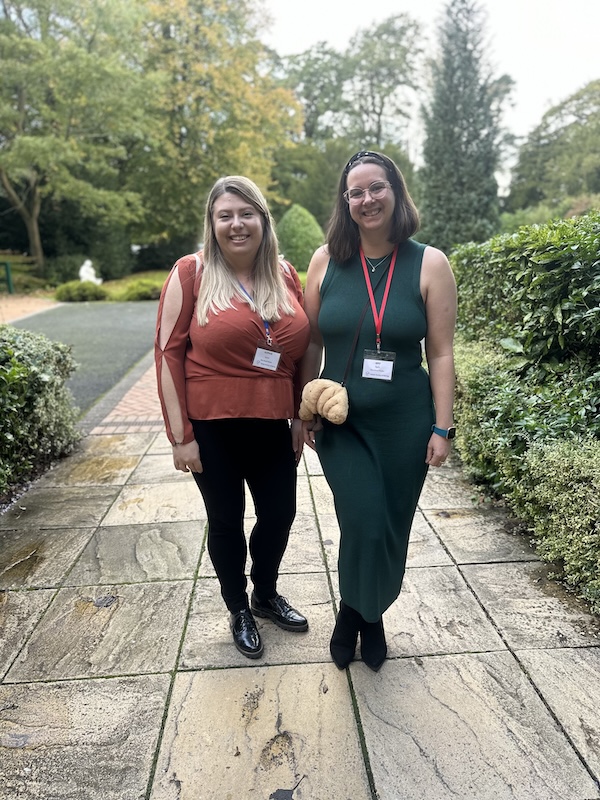The British Society of Baking tackled topical bakery issues at its Autumn Conference: Is bread an ultra-processed food? How to drive growth. How to transform a business. Spotting a gap in the market. Owning and expanding a large artisan bakery. And the psychology of colour in bakery.
Alongside excellent networking opportunities at drinks and meals, the talks provided a platform both for learning and inspiration. A short extract from each looks at taking ideas forward.
Is Bread an Ultra Processed Food?
The first speaker, Mike Adams, head of product innovation and insights at Campden BRI, tackled bread being portrayed as an ultra-processed food. Taking a neutral stance and giving a science-based talk, he explained the muddle in defining UPF’s. For example, with the Chorleywood Bread Process, does mixing dough fast and adding Vitamin C, make it ultra-processed?
And to confuse matters, there are no less than 3-5 different classification systems which attempt to define UPF’s! One called the Nova system is gaining wider acceptance.
An unofficial guide at present is:
*Does it have more than 5 ingredients *Is it made by a multi-national company *Are there ingredients you don’t recognise *Does it have a health claim *Is it wrapped in plastic.
All of these have flaws, Mike said! He also pointed out that many UPF’s can form an important part of a well-balanced, healthy diet such as low-sugar breakfast cereals and, significantly, high fibre bread!
Some attributes, identified as inherently critical, such as structure and texture, may be challenging to modify. Importantly too, there is little actual evidence of the impact of additives such as emulsifiers on health. Press headlines are inconsistent and range from stating that UPF’s are linked to an increase of cancer and cardio-metabolic diseases to stating that a certain study linked “UPF’s –not bread and cereal – to poorer health”. One research paper named beverages and animal products such as red and processed meats as being two key categories already known to carry risks.
Obviously this talk was expanded much more but it did reveal that the classification of UPF’s and any possible effects of enzymes used in breads on human health are still not adequately known or defined.
Driving Growth, Maintaining Trust
Helen Bowyer is Commercial director of Compleat Food Group, which owns Wrights. The company started 98 years ago with John Wright making meat and potato pies. It used to be widely known as Wright’s Pies but has grown steadily and securely, branching out into making other bakery products and supplying not just consumers but international airlines, foodservice and now major retailers. Meanwhile adding to its bakery portfolio with other snacking foods such as olives, dips, oriental and continental snacking products. The latter expansion taking place under the ownership of great grandson, Peter Wright.
In 2021 he sold the business to Compleat Food Group, aided by Ian Dobbie Consulting. Helen Bowyer was a visionary employee of Wrights, having started in procurement 8 years ago. But she has seized the opportunity to drive yet more growth while maintaining both companies’ trusted reputation for innovation.
Now commercial director of Compleat, an overall £1bn company, Helen explained the process of integrating the companies, rationalising products and pay structures, investing in automation for de-skilled areas, coping with the impact of inflation plus ways to mitigate its impact. She ensured stability of the supply chair and brought in new, high-level NPD personnel to focus on quality.
All these were key changes and led to opportunities to promote the Wright’s brand, give stronger support to independents through wholesale and to innovate with products more relevant to the next generation. There was also a vital focus on ESG (Environmental, Social and Governance).
Other helpful tips which demonstrated her positivity included:
Be aware of the wider market, and stay ahead of the curve. Tap into seasonality/limited additions to drive interest and give consumers the reason to come back to you. Be aware of global innovation / trends and bring influences back into your products . Social media trends –make products bigger, bolder, more visually appealing. When disposable income is more limited, the ‘treat’ occasion becomes even more important.
Think of everyday as a school day and work as a team. Ensure you tap into your colleagues / wider network for support, guidance, objective opinion. It boosts team morale to feel involved.
Finally, have a positive mind-set, be solutions focused. Helen emphasised: “ If we can tackle Brexit, record inflation, labour challenges and Covid in the space of 3 years then we can get through anything thrown at us – never underestimate yourself!”
Frank Bird, business award-winning CEO of Hill Biscuits, Ashton under Lyne, near Manchester, recently oversaw the sale of Hill to cereals food manufacturer, Cerealto. The British apparently eat more biscuits per person than any other country. From a small shop in 1855 to a bakery in 1893 Hill is one of the oldest biscuit manufacturers in the UK. It makes custard creams, fruit shorties, bourbons, malted milk, gingerbread men and digestives. Sales in 2022 were £26m, this year they are forecast to be £43m, Hill is motoring. But it has taken a well thought out strategy to get it there; one which relies on operational excellence, attention to detail, vision, a caring attitude to colleagues and customers, a listening focus towards all and flexibility. Frank Hill says he has gone for the gaps with 10 fundamental criteria. These include investing in people by supporting a ‘growth mind-set’ through training, diversity and inclusion at all levels. Investing in equipment and processes using data to hunt for efficiency. Reviewing practices and systems to improve ways of working and a ‘right first time’ approach. Using data to analyse progress and support decisions in other words, seek the solution, not the problem. Work with suppliers to enhance quality, improve cost and supply chain efficiencies. Drive innovation, be agile, know your market but listen to your customers. And have some fun on the journey but bring people with you.
‘Going for the gap – and Nailing It’ was the title of Rhiain Gordon’s presentation. The young entrepreneur had already won Scottish Baker of the Year but hearing how her business started, listening to her enthusiasm and observing her business acumen inspired many. She began after losing her job during Covid, having previously worked in hospitality, at a bakery and as a barista.
Looking back, she realised how much she’d enjoyed baking with her granny. Looking forward she began baking at home, believing there was a gap for originality and quality and sending out her products by post. By the time life had re-started, Rhiain had opened her own bakery and shop in Leith, selling mostly cookies and brownies. Now she’s opened a second shop in Portobello. With a fun and active presence on social media, including over 35 thousand followers, she shows the products as well herself and team members, because ‘people support the person as well as the business’. Her top tips for success are to provide really good customer service, for example ask them how their day is going. ‘Engage’ on social media, ‘look after your team’ – she organises outings, pays fair wages and there is no night work. Rhiain also suggests tailoring training to the individual, being flexible when it comes to tasks, having a good support network – and drinking caffeine!
Steve Magnall is owner and MD of Two Magpies Bakery. With 10 outlets cross Norfolk and Sufolk?? his mission is clear: ‘To be the best independent artisan bakery, producing bread, pastries and savoury products by hand using only the finest raw ingredients’. He says that all products are lovingly made by hand in line with the company’s values of authenticity integrity and care.
Steve employs over 100 artisan bakers, pastry chefs and baristas and started out over 30 years ago with a food science degree and an MBA. With a background leading strategic success in company’s such as Greene King, he bought a 50% share in Two magpies in 2018 and then became sole owner and MD in 2023 building up the business with the help of operations director, Yasmin Wyatt.
Steve took delegates through his 10 point NPD system which includes hero products such as sausage rolls, croissants and full English breakfast that don’t change, hero products that do change: e.g. brownies, Danish and donuts, introducing new products every two months removing slower selling ones, planning 4 months ahead and using what is seasonal. At any one time they can have up to 80 different products, all costed and worked out for allergens and calories!
Steve’s leadership style is to pay above the minimum wage, while training is three ways: online, internal and external. He says: “My comment about leadership is ‘use your gut instincts but listen to the (financial) numbers because many a business has failed due to cashflow issues and vanity.” His labour costs are high but so is the business’s reputation. His company has won Suffolk’s Retailer of the Year, Best Bread in Britain, Best Sweet Product in Britain, and at BIA, Employer of the Year. Ideally he’d like to get to 40+ outlets comprising a mix of Magpies and Mini Magpies (cafes) .
If it comes down to his passion and drive, plus the economy is healthy, it seems that Steve’s bakery ‘where everything is made by hand, daily’ stands a winning chance.
Bakers know how to use colour but inspiration is always welcome and without doubt it helps to trigger sales when we ‘eat with our eyes’.So understanding what emotions colours inspire in baked goods can only give vendors an advantage if used effectively.We can all associate orange (pumpkins) with Halloween, red with Xmas, yellow with Spring and, well, er blue with summer?
Emiio Saklambanakis of Oterra,which supplies natural colours, is a colour specialist when it comes to psychology. He explained to delegates the power of colours and the different emotions that colours can trigger. For example: People make decisions in the first 90 seconds after interacting with products, 70% of decisions are made in front of the shelf. Pink is a very positive colour. It symbolises creativity, femininity and calm. Orange is flamboyant, freedom and playfulness. Peach offers, comfort, being good-natured, happy and optimistic, while black alludes to passion, sophistication, power and style. Blue was less associated with bakery until blueberries became a big hit and now Oterra will be introducing a new ‘Jungle Blue’ designed to catch people’s attention. Emilio explained that it comes from the Jagua fruit, Genipa americana and Oterra developed and patented the extraction process for the colourant. It is similar to a denim blue and of course mixes well with other colours, especially greens and purples. The future is where your imagination takes you!
All the sessions were very ably chaired by Ian Dobbie of Ian Dobbie Consulting and Hannah Sibley of Aryzta who introduced the speakers and handled the many questions for speakers at the well attended BSB Autumn conference. The Spring event will be 16 April at the Cotswold Hotel and Spa Chipping Norton with an optional golf day plus a networking dinner on 15 April.










